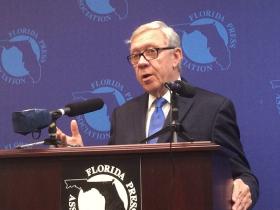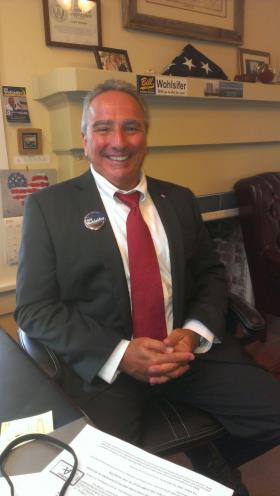Rick Scott may be the Governor of Florida, but it can be questioned whether he acts in the best interest of the voters, or those who have given money to him and his cronies. In a completely in-your-face
governorship, where cronyism runs rampant, it is apparent that being friends, financiers, and former co-workers of Rick Scott is the best position to be in if you are a Floridian.
This is apparent by his recent approval of two nuclear power plants being erected in South Florida, even though the residents of Miami-Dade vehemently opposed the proposal. Even though the voters were against the construction of the two plants, the Governor sided with his friends at Florida Power and Light and green lit the project. It would be good to think that Gov. Scott did this with the best interest of Floridians in mind, but the fact that over the last 18 months FPL has donated a half a million dollars and Duke Energy donated $150,000 to his campaign definitely raises some eyebrows about the decision.
Of course, that could have been a coincidence. Unless of course one were to look at the FPL pipeline deal that was approved by the Republican Governor’s appointees. The Florida Public Service Commission, in which all of the members were appointed by Gov. Scott, approved the construction of the Sabal Trail as the state’s third major natural gas pipeline. Florida Power and Light had a natural gas pipeline they were in control of, which makes sense, being that they are a power company. What does make the rest of the eyebrows raise is that FPL chose Spectra Energy to build and operate the $3 billion project. Unbeknownst to the voters, Governor Scott possessed a stake in Spectra Energy at the time of the deal.
Although, he does claim that it was owned as part of a blind trust and he had no knowledge of the contents of the investment. Maybe we can give him the benefit of the doubt. Although, when one is reminded of the now-defunct Crystal River nuclear plant, and the canceled Levy County nuclear project and how Duke Energy customers are still taking on the $3.2 billion burden of these projects, one should probably question why the burden of failed proposals is still being passed on to the citizens of Florida, at the average cost of $9.00 a month.
One should also remember how he gallantly rejected $2.4 billion in federal dollars to build a railway that would eventually connect Miami, Orlando and Tampa, due to the eventual tax burden it would impose on Floridians. This appeared to be a case that Gov. Scott was looking out for his constituents, until he came out in support of the Orlando to Miami rail system known as All Aboard Florida. Not surprisingly, Scott’s Chief of Staff, Adam Hollingsworth, has ties to one of the companies involved in the project, and when asked if Mr. Hollingsworth had input concerning the project, Scott declined to answer.
It is also impossible to forget how in his first year in office Scott passed a bill requiring all state employees, and cash welfare recipients to pass a drug test. The U.S. Supreme Court recently rejected Scott’s petition to review a ruling that his bill is unconstitutional, but has to wonder whether or not Gov. Scott would have even passed such a bill if he hadn’t recently given his controlling portion of stock in one of the state’s largest drug testing companies over to his wife.
This sort of cronyism and corruption occurs all across Florida every day, Rick Scott just being the easiest of targets. The person elected to keep this kind of corruption in check is the Attorney General, Pam Bondi, who has done nothing to rein in Gov. Scott and his cronies. The state of Florida needs someone in office who will stop this sort of collusion between state officials and the guys with whom they swap locker room tales.
Bill Wohlsifer (LPF) is the candidate for Attorney General who vows to declare war on these highly unethical and potentially illegal actions. He promises to investigate any allegation into corruption in the state government in order to ensure that the “little guys,” or “underdogs” get equal protection under the law. Protect the future of Floridians by making sure that the state government doesn’t become just another hot bed of patronization for the friends of whatever “family” happens to be in charge of the state, vote for Bill Wohlsifer.

Matt Wright is a writer and political activist living in south Florida. He has a BS in communications and is currently working for the Bill Wohlsifer for Attorney General campaign. To hear more from Matt you can follow him on Twitter at @mrwright79 or Like him on Facebook.


